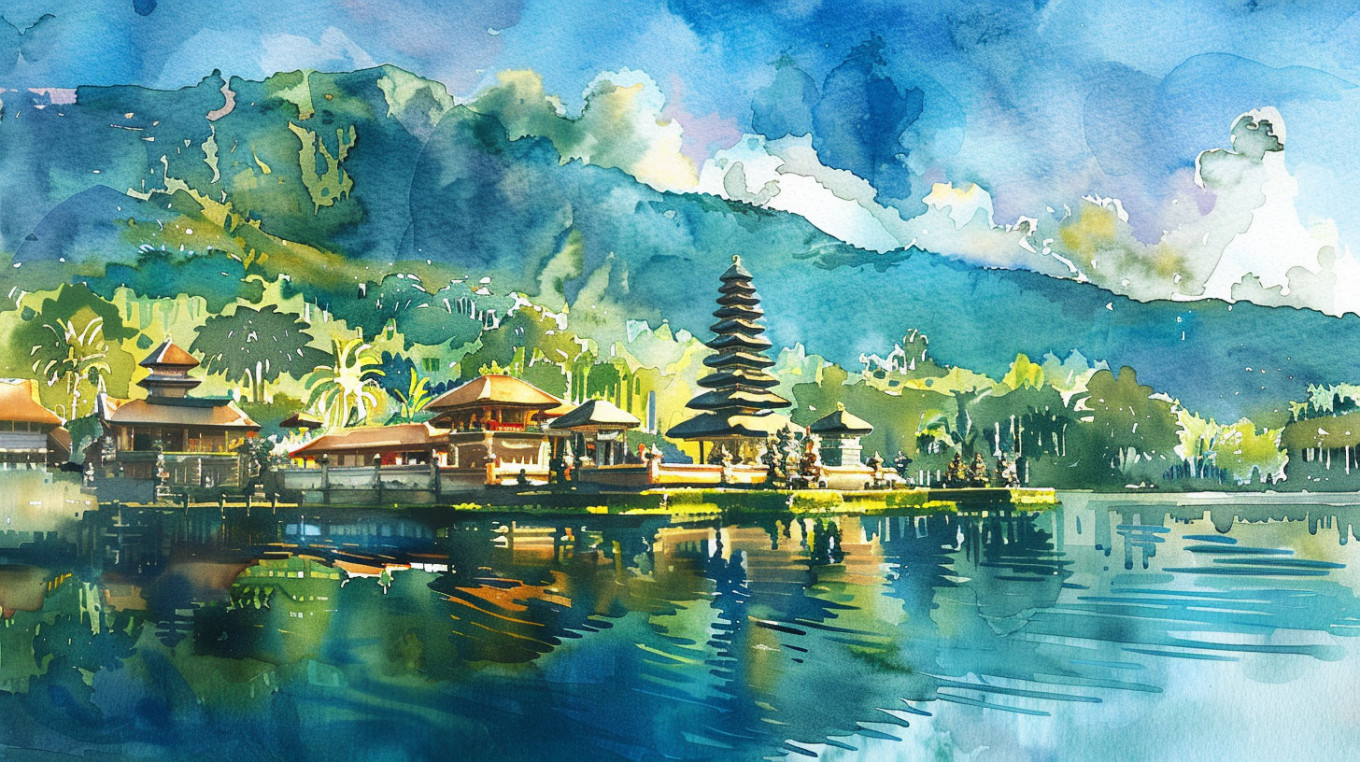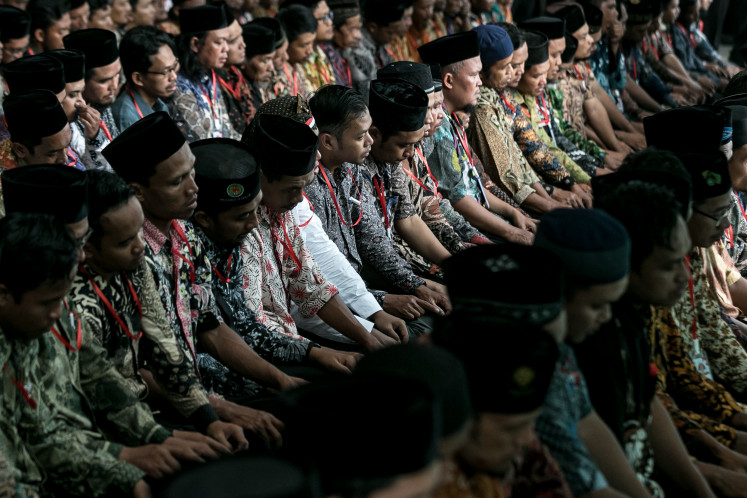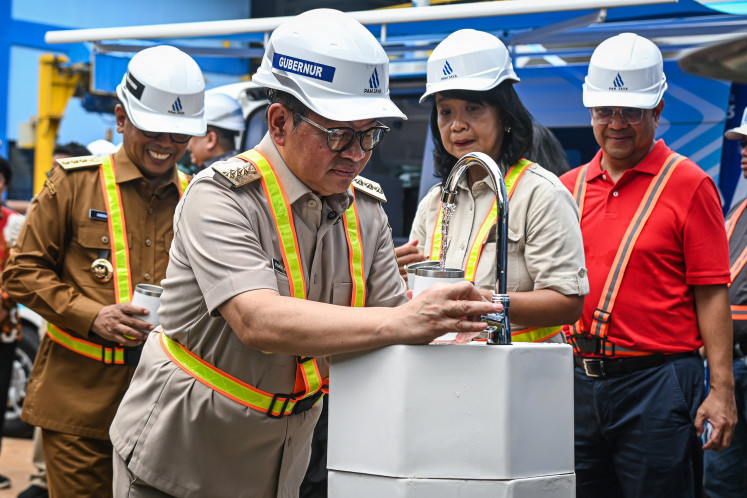Popular Reads
Top Results
Can't find what you're looking for?
View all search resultsPopular Reads
Top Results
Can't find what you're looking for?
View all search resultsUnveiling Indonesia's potential on global stage
Change text size
Gift Premium Articles
to Anyone
A
mid the buzz and excitement surrounding the recent exclusive Taylor Swift concerts in Singapore, it is an opportune moment to shift our focus toward branding Indonesia as a nation. Let us explore how we can strategically position Indonesia on the global stage.
In the competitive global arena, where approximately 200 sovereign entities strive for recognition and economic prosperity, Indonesia faces the significant challenge of establishing its unique appeal and presence with the global audience. Situated at a distance from the central axes of global activity, Indonesia’s geographic position calls for a sophisticated and strategic approach to nation branding. Transcending ephemeral marketing tactics that may garner transient interest, Indonesia must engage in profound corporate-branding initiatives to construct a resilient national brand that resonates with tourists, trade partners and investors alike. Enter the intricate domain of nation branding. Nation branding refers to a process in which a country claims a distinct brand positioning in the minds of its citizens, international stakeholders and the global audience. To claim such a positioning, countries invest resources in coordinating and integrating a multitude of activities.
A national brand serves as a pivotal beacon, influencing global perceptions and attracting stakeholders worldwide. The creation of an influential national brand goes beyond mere visual aesthetics; it necessitates the fostering of a distinctive identity that is deeply rooted in the nation’s cultural fabric, core values and unique attractions. Indonesia, endowed with a rich cultural heritage, awe-inspiring natural landscapes and renowned hospitality, is well-positioned to capitalize on these intrinsic qualities to establish itself as a foremost destination in the international tourism market. Nation branding is crucial because it helps shape the international perception of a country, influencing tourism, investment and diplomatic relations.
In the sphere of nation branding, several countries have distinguished themselves through strategic positioning and compelling brand narratives. Drawing inspiration from success stories across the globe, Indonesia can glean valuable insights from neighboring countries such as Singapore, Thailand and South Korea, each having carved a distinct identity in the international tourism landscape. Highlighting unique cultural heritage, natural landscapes and other intrinsic qualities can help differentiate the country’s brand.
Singapore: A beacon of modernity and efficiency
Singapore has meticulously cultivated a brand synonymous with state-of-the-art technology and efficient infrastructure. Through urban planning and investment in cutting-edge technologies, Singapore has emerged as a global hub for business, innovation and tourism. Iconic landmarks like Marina Bay Sands and Gardens by the Bay epitomize its modernity and forward-thinking approach. Indonesia can learn from Singapore's emphasis on urban development and technological advancement to enhance the infrastructure and amenities in its key tourist destinations.
Thailand: Exotic beaches, cuisine and hospitality
Renowned for its exotic beaches, vibrant cuisine and warm hospitality, Thailand has captured the imagination of travelers worldwide. From the bustling streets of Bangkok to the serene islands of Phuket and Koh Samui, Thailand offers a diverse range of experiences. The country's branding efforts have focused on promoting its rich cultural heritage, culinary delights and natural attractions, attracting millions of visitors annually. Indonesia can emulate Thailand's success by highlighting its own culinary diversity, pristine beaches and warm hospitality to appeal to a global audience seeking immersive cultural experiences and picturesque landscapes.
South Korea: The cultural Hallyu wave and technological advancement
South Korea's ascent as a global tourism destination can be attributed to its thriving cultural Hallyu (Korean Wave) movement, world-class electronics industry and picturesque landscapes. Through popular culture exports like K-pop music and Korean dramas, South Korea has captivated audiences worldwide, driving tourism influxes and fostering cultural exchange. Additionally, the country's reputation for technological innovation has bolstered its image as a progressive nation. Indonesia can draw inspiration from South Korea's success by leveraging its own cultural assets to create compelling narratives that resonate with international audiences.
Incorporating elements from these successful nation-branding strategies, Indonesia can refine its own approach to tourism promotion, capitalizing on its diverse cultural heritage, natural landscapes and hospitality to position itself as a premier global tourist destination. By embracing innovation, fostering stakeholder collaboration and prioritizing sustainability, Indonesia can chart a course toward tourism prominence while preserving its rich cultural and environmental heritage for future generations to cherish.
At the heart of Indonesia's tourism strategy lies destination branding, an intricate process aimed at creating a captivating brand identity that captures the imagination of travelers worldwide. Central to this endeavor is the development of a memorable brand that encapsulates Indonesia's rich cultural tapestry, awe-inspiring natural beauty and intrinsic warmth. Through consistent messaging across all promotional materials, Indonesia seeks to foster recognition and recall among potential visitors, enticing them to explore the wonders of the archipelago.
Setting Indonesia apart from its competitors requires a strategic positioning strategy that accentuates its unique selling propositions (USPs). From its idyllic islands to its vibrant cultural heritage and unparalleled biodiversity, Indonesia offers experiences found nowhere else on earth. By showcasing these distinctive attractions, such as the Komodo National Park and Borobudur Temple, Indonesia aims to carve out a niche in the fiercely competitive global tourism market.
An integrated marketing communication approach serves as the linchpin in amplifying Indonesia's tourism appeal. Through a blend of traditional and digital channels, Indonesia seeks to extend its reach to a broader audience. Compelling storytelling, supported by the testimonials of past visitors, emerges as a powerful tool in engaging potential tourists. Moreover, optimizing Indonesia's online presence through social media platforms and user-generated content amplifies visibility and fosters greater engagement. Nation branding is a collaborative effort that involves various stakeholders, including government agencies, businesses, cultural institutions and citizens. Engage these stakeholders to gain their support and involvement in your branding initiatives.
Replicating Bali's success
Bali, with its enchanting beaches, vibrant culture and warm hospitality, stands as a shining example of Indonesia's tourism potential. The success of Bali's branding and marketing strategies can serve as a blueprint for other Indonesian tourist destinations. By leveraging Bali's allure and adapting its successful approaches, destinations such as Yogyakarta, Lombok and Raja Ampat can enhance their visibility and attract a larger share of international tourists.
In an era marked by growing environmental consciousness, sustainable tourism practices emerge as imperative. Indonesia must prioritize eco-friendly initiatives that minimize environmental impact while offering immersive experiences to travelers. Collaboration with local communities, businesses and international agencies becomes instrumental in fostering responsible tourism development that preserves Indonesia's natural splendor for future generations.
Effective measurement of the impact of branding and marketing strategies emerges as critical in refining Indonesia's tourism approach. Through robust monitoring mechanisms and solicitation of feedback from tourists, Indonesia can continuously adapt its strategies to align with evolving market trends and visitor preferences. The landscape of nation branding is constantly evolving, so be prepared to adapt your strategy in response to changing circumstances, trends and feedback.
In conclusion, Indonesia stands poised to emerge as a preeminent global tourist destination, endowed with a wealth of cultural and natural wonders awaiting discovery. By drawing inspiration from the successes of countries within the region, Indonesia can craft a comprehensive and strategic approach to nation branding, positioning and marketing. Through a holistic and adaptive strategy, Indonesia can chart a course toward tourism prominence while safeguarding its cultural and natural heritage for generations to come.











